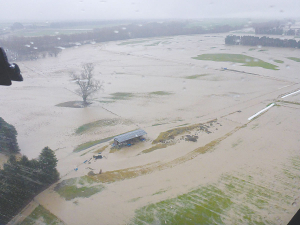Doco maker wrong
OPINION: A documentary maker who wrongly claims in his film that cows in New Zealand live only one quarter of their 20 year natural lifespan is rightly facing a backlash from farmers.
 Whatever the event, the priorities for stock management remain the same: water, feed, shelter and maintaining good health.
Whatever the event, the priorities for stock management remain the same: water, feed, shelter and maintaining good health.
Livestock can be stressed in many situations - adverse events being no exception.
The level of stress inflicted by adversity is influenced by the condition of your livestock at the time of the event, including being pregnant, the time of year, and age of the stock. Whatever the cause of the event, the priorities for stock management remain the same: water, feed, shelter and maintaining good health.
There are a number of key considerations and actions required to minimise stress in stock following or during an adverse event:
Water is essential at all times
In drought/ extreme dry – check troughs daily, especially in hot, windy conditions. After flooding, ensure access to clean water. After frost and snow check troughs daily and break any ice covers. If feeding supplements, water requirements will increase.
Maintain a feed budget and update as necessary
Create a feed budget, preparing for the worst. Plan to continue supplemental feeding even after the dry breaks, while pastures recover. Introduce any supplemental feed slowly to prevent acidosis in the rumen. Increase feed levels when stock are cold to prevent weight loss.
Shelter can improve conditions for stock
Offer shade from the sun, especially in hot, windy conditions. During weather events, move stock to higher ground. Avoid standing stock in small spaces for too long to prevent pasture becoming muddy. Move stock nearer to shelter (such as trees), where wind speed can be reduced by up to 90%. Provide protection from harsh winter conditions, particularly heavy snow.
Recognise the signs
Stock react to stress differently, with signs of stress developing immediately or over a period of time. Signs of stress include a lone animal wandering away from other stock, being lethargic, losing condition, running up and down fence lines and not eating or drinking.
If a stressful weather event is forecast, or is a seasonal event, prepare your stock in advance. Make sure sheep and cattle have access to the correct amount and type of feed and are not deficient in trace elements. This will ensure your stock are well prepared for the event.
Changing feeds
When animals are caught in an adverse event and pasture availability is limited, stock become hungry with a tendency to overeat when feed is made available. Introduce feed slowly and in limited amounts to reduce the risk of acidosis.
Maintenance
Your local farm suppliers, vets, consultants and bankers are also useful contacts. They have the best local knowledge and ideas to try and help you through these tough times.
Source: Beef+Lamb NZ
The Push-Up Challenge, an event which combines mental health and fitness, is set to launch in New Zealand in 2026.
Last month's Agritechnica event led to a wide group of manufacturers celebrating successes when the 2026 Tractor of the Year Competition winners, selected by a panel of European journalists, were announced in Hanover Germany.
According to the latest Federated Farmers banking survey, farmers are more satisfied with their bank and less under pressure, however, the sector is well short of confidence levels seen last decade.
Farmer confidence has taken a slight dip according to the final Rabobank rural confidence survey for the year.
Former Agriculture Minister and Otaki farmer Nathan Guy has been appointed New Zealand’s Special Agricultural Trade Envoy (SATE).
Alliance Group has commissioned a new heat pump system at its Mataura processing plant in Southland.

OPINION: The release of the Natural Environment Bill and Planning Bill to replace the Resource Management Act is a red-letter day…
OPINION: Federated Farmers has launched a new campaign, swapping ‘The Twelve Days of Christmas’ for ‘The Twelve Pests of Christmas’ to…